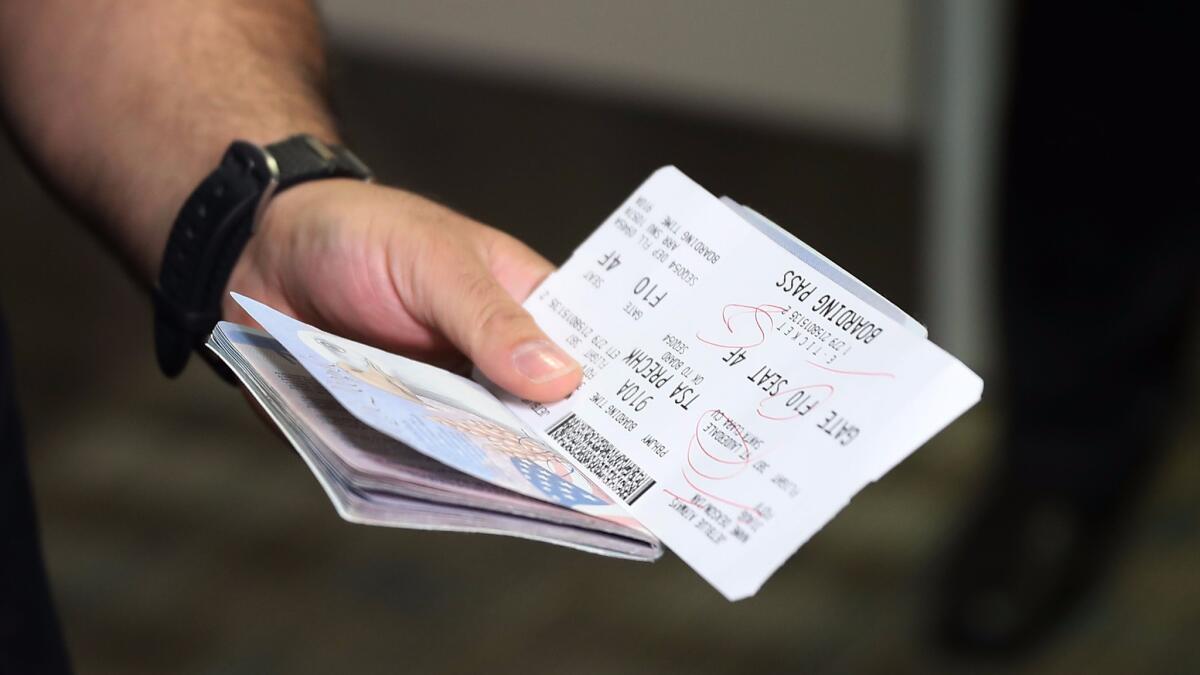When a fare may seem unfair

- Share via
Question: We had to rebook our son on a later flight from LAX to Barcelona, Spain. When we called United, the agent said his return flight had to be canceled. She rebooked his return flight reservation even though, after she did so, he returned on the same plane in the same seat, on the same day, as the original booking but at a tremendous extra expense plus the $300 change fee. Essentially, we had to pay for his ticket twice. Why is this?
E. Vo
Loma Linda
Answer: This story has a few twists and turns, so let’s start with what you should know about rebooking a ticket:
— You usually can rebook an airline ticket, but you will usually have to pay a change fee and you may have to pay the difference between what you paid for your original ticket and what your ticket will cost you at that moment.
— We say “usually” because there are tickets you can’t change. I am reminded by George Hobica, founder of Airfarewatchdog.com, that tickets on some low-cost carriers are not changeable. Sometimes tickets bought from consolidators — that is, third parties that offer super-low rates on tickets — can’t be changed either. It’s sort of like buying something on Ebay you can’t return. You buy it, you hate it, you’re stuck with it.
— But you usually can change a ticket on a carrier such as United. If United told Vo that her son’s whole ticket had to be canceled and rebooked — all still on United — that’s incorrect. Otherwise, when life intervenes and we do need to make changes, how could we change that ticket (and grumble about high change fees)? We could not.
Did the message that the ticket had to be flushed down the toilet and a new booking made get communicated? Possibly. We weren’t there so we can’t say for sure. But, said Rick Seaney, chief executive of FareCompare.com, “It is not unusual, especially nowadays, to have agents that are fairly green.”
If somebody tells you that you can’t change your outbound flight, for example, without “changing the whole thing, that’s absolutely not true” in a case like this, he said.
— Here’s what is true, and Hobica, Seaney and United do agree on this: You usually cannot cancel the first half of your ticket and preserve the return ticket. In this case, you will have to rebook.
And this may be the crux of the problem for this family.
The new outbound flight on which United wanted to rebook the son wasn’t going to work for him either. The simple solution seemed to be to cancel the outbound flight and keep the return flight.
But airlines will not, not, not do that.
“When you cancel the first leg of a round-trip nonrefundable ticket, it voids the entire ticket and the fare and the subsequent segments are also canceled,” Mary Clark, a United representative, said in a email.
The good news? “When the ticket is canceled prior to departure, the value of the original ticket is preserved for one year from date of issue and can be used toward a new itinerary, less a change fee,” Clark said.
Why this is the way of the world has to do with something called “hidden cities” routing, and airlines don’t like it one bit when you do this.
Let’s say you want to fly to Salt Lake City. You find a fare on Delta for $233 for a hypothetical Oct. 6-11 round-trip ticket from LAX.
That’s not a bad price. But wait. There’s a round-trip ticket on Delta to Dallas for $204 that stops in Salt Lake City. Why not buy that ticket, get off in Salt Lake City (and take your carry-on bag with you), then get back on for the return leg? You will, after all, save $29.
This is a very small example of what airlines consider gaming the system. So why not?
Because this is generally against airline rules, and let’s not hear any arguments that say this is wrong and unfair. I’m not saying it’s right or fair. I’m not saying it’s wrong and unfair. I am saying those are the rules, and they’re spelled out in most airlines’ contracts of carriage. Like most everything that has to do with the airlines, your winning poker hand is weak to nonexistent.
To prevent you from doing this, if you don’t board your return flight in Dallas, the airline is going to cancel your ticket because you are a no-show. (This is why people who are trying to game the system find it works better with one-way tickets.)
The slight exception to this happened to me recently on a flight from LAX to Wichita, Kan., that stopped in Dallas. Because of weather, I missed my connection in Dallas. American couldn’t get me to my destination in time, so I rented a car and drove from Dallas to Wichita.
I still wanted to fly home from Wichita because I was going to wind up there anyway.
I called American and it “preserved” my return ticket. It wasn’t my fault I missed my connection. It wasn’t American’s either, but clearly no one in their right mind would want to do this just for the joy of driving 300 miles in the dark and rain. Thank you, American, for avoiding what I like to call the “assumption of evil intent.”
But in other instances, the airlines may assume evil intent and, if not evil, a least a little duplicitous.
If you get caught gaming the system, the airline may bar you from flying, take away your frequent-flier miles or inflict some other form of punishment, as if flying itself weren’t punishment enough.
This desire to keep you from perhaps saving a buck at the airline’s expense may be what Vo & Co. ran into. Again, we can’t say for sure what transpired, but United did offer Vo a sweetener that would offset the change fee and maybe a little more.
But we can say this:
— If you cannot make a flight, call to let the airline know. You may not be able to use the ticket now, but it should have some value (unless it’s wiped out by the change fee). Remember, “no show” not only means you didn’t show up for your flight, but it also means you are shown no mercy.
— Make sure you know whom you’re buying from. On Kayak, an airfare aggregator, you’ll now see a listing on the left side that shows “booking providers.” Some names you’ll recognize (Expedia, the online travel agency). Others you may not know (Vayama, for instance, a consolidator). Before you push the buy button, make sure you know the iron-clad rules.
— Finally, if you are looking for a deal on an airline ticket (which wasn’t the case here), these days you might look for two one-way tickets.
For instance, instead of saving a mere $29 from the example above and risking your rep, try the “one-way” option that many booking engines now offer.
I could buy a ticket to Salt Lake on American from LAX and a ticket to LAX from Salt Lake on Alaska for a total of $162, which saves me $71 on the legit round-trip fare.
Sometimes it does pay to follow a different set of rules as long as you know what they are.
Have a travel dilemma? Write to [email protected] We regret we cannot answer every inquiry.
More to Read
Sign up for The Wild
We’ll help you find the best places to hike, bike and run, as well as the perfect silent spots for meditation and yoga.
You may occasionally receive promotional content from the Los Angeles Times.







